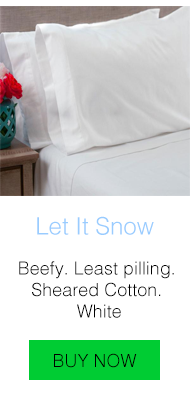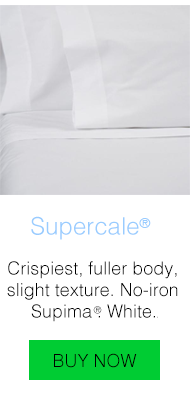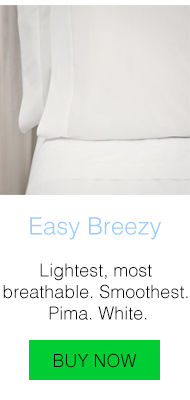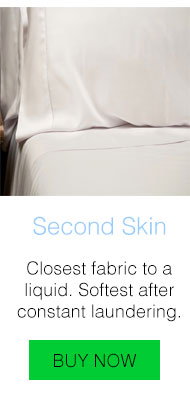How to Keep your Family Safe from Chemicals with Organic Sheets
Summary: The market for organic sheets is absolutely ripe for fraud because sheets labeled organic make more money for manufacturers and are hard to verify. Organic sheets have natural pesticides that are often more toxic, and often use stronger chemicals during processing. Current government regulations are not enough to protect us from these chemicals. And you most certainly can't wash out these chemicals. The most reliable way to buy organic sheets that are safe for your family and for the environment is to look sheets that have both the Global Organic Textile Standard (GOTS) and chemical-safe Oeko-Tex 100 certifications.

Read on to discover:
- Why an organic sheet can legally have synthetic chemicals and be made using child labor or by releasing chemical effluents in local water bodies.
- Why you need to be aware of fraud when you're buying organic
- Why organic sheets most certainly have more chemicals than regular sheets
- Why despite all these concerns, organic sheets are worth buying
- What you should look for when buying organic cotton sheets
- Our recommendation for the best organic sheets on the market.




Organic cotton can legally be made using synthetic chemicals and child labor
Cotton is legally organic if it meets only 2 conditions:
- It is not genetically modified
- No man-made pesticides and fertilizers are used
So an organic cotton sheet could legally have all of the following:
- Can be manufactured using synthetic chemicals
- Can be grown employing child labor and other labor abuses
- Can be grown while releasing harmful effluents in neighboring water bodies
The organic market is "absolutely ripe for fraud"
Only 0.1% of global cotton output is organic, because for a cotton farmer:
- It's expensive to convert his entire farm from regular cotton to organic
- Organic crop yields less cotton than a regular crop, and
- Organic cotton is riskier because market demand for it is sometimes uncertain
Organic cotton is more expensive than non-organic, because of this limited supply. Organic cotton from Turkey, the world's largest grower, sells for about 20% more than non-organic cotton.
The 20% premium for organic cotton and overstretched inspection systems mean that “the market is absolutely ripe for fraud in organics" according to Mark Messura of Cotton Incorporated, an American trade group.
Top 4 myths about organic cotton sheets:
Myth #1: Organic sheets don't have pesticides
Organic means no pesticides or fertilizers, right? Not quite.
Organic cotton is grown with natural pesticides and fertilizers. Don’t be fooled by the word ‘natural’ though. Chemicals used in growing organic cotton can be just as harmful as synthetic pesticides, and sometimes, even more.
- Organic pesticides and fertilizers can be more toxic than synthetics, according to research quoted by Scientific American
- Farmers use 3-4 times as much organic pesticides to get the same results because organic versions are not as effective as synthetic alternatives.
Myth #2: If an organic sheet says it is USDA certified, it's safe for use
The USDA (US Department of Agriculture) is the sole authority to certify organic cotton.
But the USDA does not do the verification itself. It simply certifies 3rd-party agencies who
- rely on paperwork that shows that the cotton is organic and
- conduct only one unannounced inspection per year.
But the USDA verification system has several drawbacks:
- It provides no oversight after the fiber stage. Once the cotton leaves the farm, it travels thousands of miles and trades hands dozens of times before it reaches you in the form of sheets. En route, there could be shipping mistakes to unscrupulous suppliers who mislabel their cotton as organic. “It can be nearly impossible to know the true makeup of a fabric without having insight into the entire supply chain,” says the cotton verification company Pimacott.
- Synthetic pesticides meant for a neighboring crop 'accidentally' end up on organic crops. This happens because agencies only conduct one unannounced inspection each year.

As a result, there have been cases of outright organic fraud. 47% of the 3rd-party agencies failed to uphold basic USDA standards according to an investigation by the Wall Street Journal.
Certifying agencies are able to get away with it because
- Punishments are weak. Mistakes by first-time offenders incur only warnings. Repeat or flagrant errors disqualify the farmer but penalties are small and are rarely applied.
- There is no test to check if an organic sheet is truly organic, according to Cotton Incorporated, a leading industry body. Suppliers know this, so they claim their cotton is organic.
Myth #3: Organic sheets are manufactured without harmful chemicals
Chemicals are used to make organic sheets. In fact, in most cases, more chemicals are used to make organic sheets than regular sheets.
Organic crops use more chemicals? This seems counter-intuitive, is it true?
If you think about organic carrots they’re shorter, rougher, scrubbier and ‘knobbier’ compared to non-organic carrots. Compared to non-organic vegetables, fruits and other plants organic products are visibly as well as structurally inferior. Without the help of synthetic fertilizers and pesticides, stronger, longer, finer more-uniform cotton fiber cannot be grown.
Why is this?Organically-grown plants are relatively “starved” of plant nutrients compared to their non-organic counterparts. They are also susceptible to insect pests, which lower the crop yield (organic farms produce only 40% as much cotton as non-organic farms). These nutrient deficiencies and pests injure the cotton plant in ways that affect how sheets feel to your touch:
- Shorter fiber length: organic cotton fibers are 20-30% shorter than non-organic. Length is the most important attribute of cotton fiber. The world’s five largest organic cotton countries’ average classification is "medium." Turkey, the world’s largest supplier also classifies their very best organic cotton as “medium.” While no organic cotton fiber is classified as such, luxury sheets require “long staple” or “extra long staple” cotton fiber.
- Uneven thickness and surface integrity: very sophisticated micronaire devices classify organic cotton in three precise grades: “premium", "base” and “discount.” The average micronaire classification of organic cotton is "base" or discount." However, luxury sheets requires fiber in micronnaire's “premium range” because ultra-fine, tightly spun yarns are required. As Cotton, Inc. says:
- In fact, Cotton Inc. says that yarns spun from shorter staple, low-micronnaire fibers are two to three times coarser than yarns from non-organic fibers. That is why coarse yarn causes sheets to be rougher, stiffer, scratchier and more prone to pills (fiber clusters).
So how are Organic sheets converted into sheets that are soft and smooth as non-organic sheets?
Simple - higher doses of chemicals make inferior organic cotton behave as non-organic cotton.
What kind of chemicals could you find in your organic sheets?
|
|
|
Looking for sheets free of toxic chemicals? If you wish to avoid chemicals that accumulate in our bodies over time, consider our chemical-safe sheets.
While the framework is improving, chemicals are innocent until proven guilty: today, the government needs to show actual harm is caused by a chemical before restrictive controls can be established.
Myth #4: You can just wash out the chemicals from organic sheets
Over time the added chemicals will be removed, why worry? Some will but not all.
My grandmother washed her new sheets with vinegar to get rid of the chemicals but since then manufacturers got smarter and now use some chemicals that can't be washed out. Here are just a few:
- Wrinkle-free (no-iron / permanent press / easy care) sheets are usually made using a version of formaldehyde, which the New York Times confirms is a toxic chemical designed not to wash out.
- Colorfast dyes used in prints and solid-color sheets are chemically bound to react with individual fiber molecules so they don't wash out.
- Softeners (such as silicones, polyurethanes and ammonium compounds) and stiffeners (such as starch resins and polyvinyls) improve the “hand feel” of the sheets.
- Anti-static, anti-pilling, anti-bacterial finishes, etc modify the cotton fiber using a diverse range of chemicals for these functional enhancements.




Organic sheets are worth buying, despite these concerns
- Are you looking for sheets that are environmentally friendly?
- Or are you actually looking for sheets free of toxic chemicals?
- What if you want both chemically-safe and environmentally friendly sheets?
___________________________________________________
Buy GOTS-certified organic cotton sheets if you primarily care about the environment

GOTS (Global Organic Textile Standard) is the most popular standard for organic textiles. GOTS-certified is the traditional way to ensure you are buying organic sheets. GOTS helps protect the eco-system as well as textile workers by ensuring:
Are there any drawbacks of GOTS certification?Possibly
- GOTS does not actually test sheets for harmful chemicals. LL Bean says, “Certifying premium cotton amounts to nothing more than ‘a paper trail.’” The problem, the Economist magazine found, is it’s virtually impossible to tell organic cotton from non-organic cotton.
- The economic incentive for fraud is so compelling. Paper chains of custody, the chronological trail of invoices and documentation which prove the ingredients of the cotton as it passes ownership in the supply chain, are vulnerable as traceability tools when farmers and manufacturers can double their profits by misrepresenting their products as organic.
- More than three-fourths of the GOTS-certified facilities are in countries (Bangladesh; China; India; Pakistan; Turkey) where documentation practices and the rule of law are questionable.
Buy Oeko-Tex certified if you are primarily looking for sheets free of chemicals

Rather than relying on cumbersome paper traceability systems, Oeko-Tex tests sheets for toxic chemicals. The list of chemicals is constantly updated to ensure they are safe from chemicals harmful to humans (it was recently increased from 100 to 300 chemicals).
- Oeko-Tex-certified cotton sheets are free of harmful chemicals. The cotton may be grown with or without synthetic pesticides and fertilizers – what counts is the final sheet does not have dangerous levels of those chemicals. Saying this another way, Oeko-Tex sheets may not be organic at all, they're just sheets that don't have toxic chemicals in them.
- People with sensitive skin or conditions such as eczema and psoriasis need sheets that are chemical-free. But we now know that a lot of chemicals are used in making organic sheets. Residues of these chemicals are in constant contact with your skin for several hours each night and could react adversely with your skin.
- Oeko-Tex chemical-safe certification applies to all fibers. It doesn’t matter if your sheets are made from organic cotton, non-organic cotton or other synthetic fibers such as polyester, microfiber, acrylic or nylon/rayon sheets.
___________________________________________________
Buy sheets with both GOTS and Oeko-Tex certifications, if you want environmentally friendly sheets with no harmful chemicals

Look for sheets that have both the GOTS and Oeko-Tex certifications. These sheets have the world's most advanced GOTS-organic certifications to prove your sheets are truly organic. They’re also thoroughly tested by Oeko-Tex on sophisticated instruments and certified to be safe from toxic chemicals.
Perfectlinens exclusive “MOREGANIC™” brand of sheets are GOTS-certified Organic and Oeko-Tex Certified free of harmful chemicals. Perfectlinens is the only retailer to offer sheets with both certifications.
Perfectlinens Realfeel™ testing identified MOREGANIC™ sheets that feel similar (or more comfortable) than many non-organic sheets.

Our mission – achieved through extensive scientific testing – is to identify sheets which truly deliver exceptional comfort after multiple washings and uses. We've tested over 200 sheets from around the world -- we sell just ten.
Perfectlinens has identified organic sheets that are uncomfortable and non-organic sheets that are comfortable. And recently we discovered MOREGANIC™ sheets that are uniquely organic and comfortable:
- GOTS-certified organic
- OekoTex-certified chemical-safe
- RealFeel lab-tested to feel nearly identical as non-organic sheets







